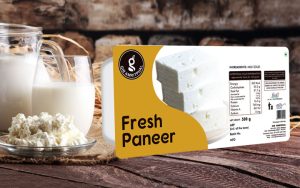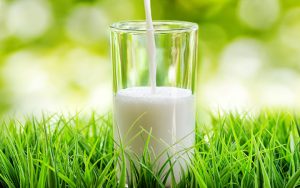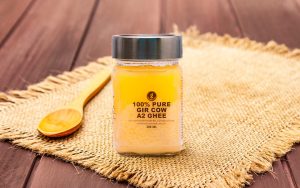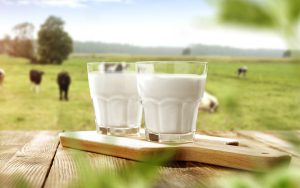Desi ghee has been a common part of Indian cooking for a long time. It is famous for being good for health, having a strong and pleasant flavor, and being linked to Ayurvedic traditions.
However, nowadays there are many types of ghee available in the market that are made using processed methods and may not be as good in quality.
Learning how to tell the original desi ghee from the store-bought kind can help you choose a better option for your family’s health.
Why Choosing the Right Ghee Matters:
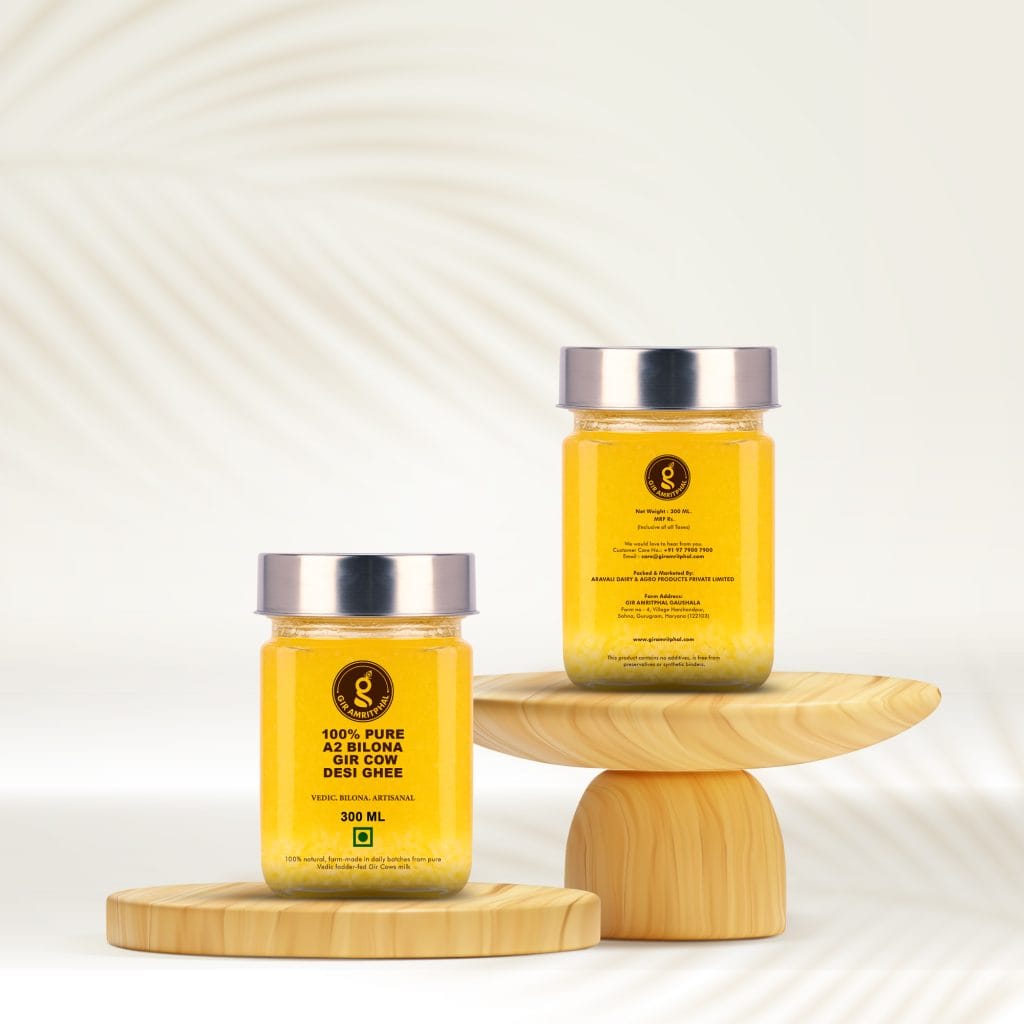
Your health is affected by what you eat every day, and ghee is no different.
Original desi ghee, especially from A2 Gir cow Ghee, has important fats, vitamins, and antioxidants that help your digestion, strengthen your immune system, and improve your overall health.
But ghee that’s mixed with harmful stuff like preservatives, vanaspati, or chemicals can hurt your body over time. Understanding what’s in your ghee is the first step to staying healthy.
Desi Ghee vs. Market Ghee: Key Differences

1. Source of Milk
Desi Gir Cow Ghee is made from A2 milk that comes from local cows such as Gir and Sahiwal. This type of ghee is known to be very nutritious and easier to digest.
On the other hand, store-bought ghee may use milk from various breeds or even powdered milk, which can lower its quality and reduce its health benefits.
The type of milk used is very important because it affects the purity and nutrition of the ghee you eat.
2. Preparation Method
Traditional desi ghee is made by using the Bilona method, where curd from A2 milk is churned to get butter, and then the butter is slowly cooked to make ghee.
This old way of making ghee keeps all the nutrients and the natural taste.
But store-bought ghee is made quickly with machines and quick methods, which take away important vitamins and change its real texture and smell.
3. Nutritional Value
Pure desi ghee has lots of omega-3 fatty acids and vitamins A, D, E, and K, which help keep the body healthy, boost the immune system, and support heart health.
But store-bought ghee is made using very high heat, which removes these important nutrients. If you’re looking for a natural way to get good fats and vitamins, desi ghee is better than the ones you find in the market.
4. Purity
Desi ghee does not have any chemicals, preservatives, or artificial colors, which makes it totally safe and natural to use.
On the other hand, ghee available in the market usually has added substances like preservatives and chemicals to keep it fresh for longer.
These extra ingredients can be harmful to your health if consumed over a long period, so choosing desi ghee is a better and safer option for you and your family.
5. Taste & Aroma
Real desi ghee has a strong, nutty smell and a slightly sweet, caramel-like taste that really makes food taste better.
But store-bought ghee doesn’t have that same special flavor because it’s made in large amounts and heated a lot.
If you’ve ever tried real desi ghee, you’ll definitely notice how much better it smells and tastes compared to the kind you buy in shops.
6. Ayurvedic Benefits
Desi ghee has been used in Ayurveda for many years. It helps with digestion, strengthens the immune system, keeps joints smooth, and helps balance the three body types, Vata, Pitta, and Kapha.
However, market ghee is heavily processed and loses most of these good qualities, leaving very few health benefits. If you want both good health and great taste, desi ghee is the better choice.
7. Price vs. Quality
Market ghee might look cheaper at first, but it can hurt your health because of lower quality Original desi ghee costs a bit more, but it’s better for you and has more health benefits.
Buying real desi ghee is like investing in your health for the future.
Make the Healthier Choice Today!
When it comes to your health, quality is better than price.
Always pick 100% pure A2 Gir Cow Desi Ghee, like Gir Amritphal, made with the traditional bilona method to get the most nutrition and great taste.
Stop using ghee from the market that has chemicals and bring home the real goodness of pure ghee.
Order Now from Gir Amritphal and give your family the best!
FAQ’s
1. Is desi ghee better than market ghee?
Yes, desi ghee is better than market ghee because it is made traditionally from cow or buffalo milk without chemicals or preservatives. Desi ghee retains essential nutrients like omega-3 fatty acids, vitamins A, D, E, and K, which are often lost in the commercial processing of market ghee.
2. What is the difference between desi ghee and store-bought ghee?
The main difference lies in preparation and purity. Desi ghee is prepared using the traditional bilona method from cultured curd, ensuring natural nutrients. Store-bought ghee, on the other hand, is mass-produced and often undergoes high-temperature processing that can destroy vitamins and may include additives.
3. Why is desi ghee more expensive than market ghee?
Desi ghee is more expensive because it is made in small batches using pure milk and a labor-intensive process. It takes 20-25 liters of milk to make 1 liter of desi ghee, whereas market ghee is mass-produced at a lower cost, sometimes using milk solids or vanaspati blends.
4. Which ghee is healthier – desi ghee or market ghee?
Desi ghee is much healthier because it is rich in good fats, antioxidants, and fat-soluble vitamins that support digestion, immunity, and heart health. Market ghee may contain preservatives, artificial colors, or hydrogenated fats, which are not ideal for health.
5. How to check the purity of desi ghee at home?
You can check purity by:
- Heating test: Pure ghee melts quickly and turns golden with a pleasant aroma.
- Water test: Add a spoon of ghee to water; pure ghee will settle at the bottom without dissolving.
- Granule texture: Real desi ghee has a granular texture, unlike smooth, processed ghee.
6. Does market ghee contain preservatives or additives?
Yes, many brands of market ghee contain preservatives, artificial colors, and flavors to enhance shelf life and taste. Some even mix vanaspati or palm oil, which reduces nutritional value and can harm health if consumed regularly.
7. Which ghee is best for health: cow ghee or buffalo ghee?
Cow ghee is considered best for daily use because it is lighter, easier to digest, and rich in A2 beta-casein protein and omega-3 fatty acids. Buffalo ghee is heavier and more suitable for people needing weight gain or higher energy levels.
8. What is A2 desi ghee and how is it different from regular ghee?
A2 desi ghee is made from the milk of A2 breed cows (like Gir, Sahiwal) that produce A2 beta-casein protein, which is easier to digest and considered healthier. Regular ghee may come from mixed breeds and lacks the same nutritional profile.
9. Why is homemade desi ghee considered better than branded ghee?
Homemade desi ghee is free from chemicals, preservatives, and adulteration. It is made from fresh cultured curd, preserving natural nutrients. Branded ghee, in contrast, is processed for mass production and long shelf life, which can reduce quality.
10. How to identify original desi ghee in the market?
To identify pure desi ghee:
- Smell: Real ghee has a natural, nutty aroma.
- Granules: Look for a grainy texture instead of smooth.
- Price: Extremely cheap ghee is often adulterated.
- Label: Check if it mentions A2 ghee, bilona method, and no added preservatives.
Reference:
https://houseofveda.com/blogs/articles/a2-desi-ghee-vs-regular-ghee-benefits-and-differences



